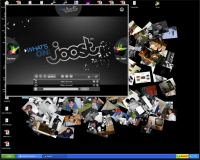








Joost was an Internet TV service, created by Niklas Zennstrom and Janus Friis (founders of Skype and Kazaa). During 2007-2008 Joost used peer-to-peer TV (P2PTV) technology to distribute content to their Mozilla-based desktop player; in late 2008 this was migrated to use a Flash-based Web player instead.
Joost began development in 2006. Working under the code name "The Venice Project", Zennstrom and Friis assembled teams of some 150 software developers in about six cities around the world, including New York, London, Leiden and Toulouse. According to Zennström at a 25 July 2007 press conference about Skype held in Tallinn, Estonia, Joost had signed up more than a million beta testers, and its launch was scheduled for the end of 2007.
The team signed up with Warner Music, Indianapolis Motor Speedway Productions (Indianapolis 500, IndyCar Series) and production company Endemol for the beta.In February 2007, Viacom entered into a deal with the company to distribute content from its media properties, including MTV Networks, Black Entertainment Television (BET) and film studio Paramount Pictures.
The company went through restructuring several times and sold most of its assets in 2009; it suspended operations in 2012.
History
Viacom, Inc., and Joost entered into a content provider agreement for the Joost platform on February 20, 2007. Under the agreement, divisions of Viacom (including MTV Networks, BET Networks and Paramount Pictures) were to license their "television and theatrical programming" to Joost.This came shortly after Viacom requested 100,000 potentially infringing videos to be removed from YouTube.com, which showed a preference by Viacom for the Joost platform over YouTube.
As of 2007, Joost had licensing agreements in place with Ministry of Sound TV, Aardman Animation, Warner Music, the production company Endemol, Fremantle Media, RDF Media, Diversion Media,and CenterStaging's rehearsals.com.On May 1, 2007, Joost signed a deal to distribute NHL content, including full game replays of the Stanley Cup Finals, and vintage games.Bollywood distributor Eros International also announced a deal with Joost in 2007.The majority of the content on Joost was restricted to users in the United States of America, due to lack of international licensing arrangements.
The company's first CEO, Frederick de Wahl,was succeeded by Mike Volpi in June 2007.Volpi stepped down in July 2009 amidst a round of job cuts, being succeeded by Matt Zelesko.Volpi blamed the content companies for sidelining Joost.
On December 17, 2008, Joost sent an email to its customers explaining that the project was moving to a website-only model, and that the Joost application would stop working Friday, December 19.
Joost's UK subsidiary was liquidated in 2009.On November 24, 2009, Adconion Media Group announced that they would be purchasing the company's assets for an undisclosed amount.Both companies have Index Ventures as a major investor.
On 30 April 2012 the joost.com website announced, without further explanation: "We are re-evaluating the Joost.com purpose and services. For the near-term we have decided to suspend the site to allow for a full re-evaluation."In May 2012, Adconion rebranded and folded Joost Media into smartclip, another company they had previously acquired.Zennstrom has written a post-mortem analysis of the company, due to appear in 2014 in the upcoming Apress book When Founders Fail.
Zennstrom and Friis's Experiance with Joost
Their reduced responsibilities after selling Skype in 2005 left Zennstrom and Friis ample time to pursue other interests, notably Joost, an Internet video service that they founded in 2006. In contrast with YouTube and its heavy reliance on short video clips uploaded by amateurs, Joost offered a wide selection of on-demand television shows from established broadcast and cable television content providers. Unlike Skype, Joost was designed to earn money through advertising, that money being shared with content providers, and, unlike KaZaA, Joost sought to protect copyrighted material for all content providers. A beta (test) version of Joost was made available to invited users in early 2007, and by the time of the official launch in May, Joost’s sponsors included the Coca-Cola Company, Intel Corporation, Kraft Foods Inc., Microsoft Corporation, and Nike Inc. However, Joost failed to become a serious competitor to YouTube, Netflix, Inc., and Hulu in the Internet video market. In 2009 Zennstrom and Friis sold Joost to the American online advertising company Adconion Media Group.
In 2006 Zennstrom and Friis founded Atomico Ventures, an investment fund that sought out European technology companies that had the potential to be successful in the global market. Niklas and his wife, Catherine, established Zennstrom Philanthropies in 2007 to support and engage with organizations in efforts to stop climate change and to support human rights. In 2010 Zennstrom and Friis founded Rdio, a subscription-based music-streaming service.